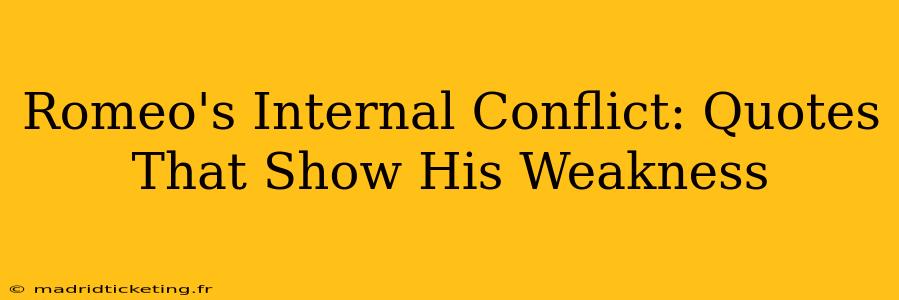Romeo Montague, Shakespeare's iconic lover, is often portrayed as a romantic hero. However, a closer look reveals a character riddled with internal conflict, showcasing significant weaknesses that contribute to the tragedy of Romeo and Juliet. While his passionate nature is captivating, his impulsive actions and emotional volatility ultimately lead to devastating consequences. This exploration delves into key quotes that expose Romeo's internal weaknesses, highlighting his immaturity, inconsistency, and susceptibility to influence.
What are Romeo's main weaknesses?
Romeo's weaknesses aren't simply flaws; they are integral parts of his character that drive the plot and contribute to the play's tragic outcome. His primary weaknesses include impulsiveness, emotional instability, and a tendency towards self-pity and dramatic pronouncements. These flaws are often intertwined, creating a cycle of rash decisions and emotional turmoil.
Is Romeo weak or strong?
This is a question that sparks much debate amongst Shakespeare scholars. While Romeo possesses moments of strength – his unwavering love for Juliet, for example – his weaknesses significantly overshadow these moments. His inability to control his emotions, his impulsive actions, and his dependence on external forces (like fate and Friar Laurence's plans) ultimately paint a picture of a character more susceptible to weakness than strength.
How does Romeo show his immaturity?
Romeo's immaturity is evident in his dramatic shifts in affection. His swift transition from Rosaline to Juliet demonstrates a lack of emotional depth and a tendency towards infatuation rather than true love. Consider this quote:
"But, soft! what light through yonder window breaks? / It is the east, and Juliet is the sun." (Act II, Scene II)
While romantic, this passage reveals a superficiality in his affections. He quickly forgets Rosaline, completely captivated by Juliet's beauty. This impulsive nature and lack of emotional stability are hallmarks of his immaturity.
How does Romeo's impulsiveness lead to tragedy?
Romeo's impulsiveness is perhaps his most detrimental flaw. His rash decisions consistently escalate the conflict, culminating in the play's tragic ending. The killing of Tybalt is a prime example:
"O, I am fortune's fool!" (Act III, Scene I)
This exclamation follows his impulsive act of revenge. He acts without considering the consequences, fueled by anger and a desire for retribution. This hasty action sets off a chain of events that ultimately leads to Juliet's death and his own suicide.
What are some quotes that show Romeo's emotional instability?
Romeo's emotional instability is another significant weakness. He fluctuates wildly between extreme joy and profound despair. His emotional volatility prevents him from making rational decisions and contributes to his impulsive actions. This is evident in his despair after being banished:
"There is no world without Verona walls, / But purgatory, torture, hell itself." (Act III, Scene III)
This hyperbolic language demonstrates his tendency towards melodrama and his inability to cope with adversity in a healthy manner.
Does Romeo lack self-awareness?
Yes, a significant aspect of Romeo's weakness is his lack of self-awareness. He fails to recognize the consequences of his actions and often blames external forces for his misfortunes. This is exemplified by his statement:
"O, I am fortune's fool!" (Act III, Scene I)
This highlights his failure to take responsibility for his own actions, instead attributing his fate to external forces. This lack of self-awareness prevents him from learning from his mistakes and contributes to the tragic cycle of events.
Conclusion:
Through a careful examination of key quotes, it becomes clear that Romeo's internal conflicts and weaknesses are far more significant than his romantic appeal. His impulsiveness, emotional instability, immaturity, and lack of self-awareness are not mere character flaws but rather the driving forces behind the tragedy of Romeo and Juliet. While his passionate love for Juliet is undeniably powerful, his inability to control his emotions and make rational decisions ultimately leads to his downfall and underscores the profound impact of internal conflict on even the most romantic of heroes.

